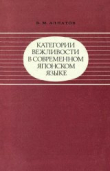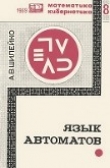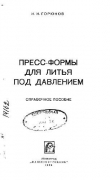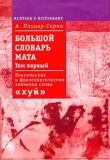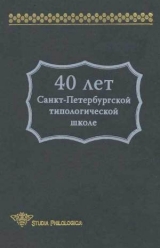
Текст книги "40 лет Санкт-Петербургской типологической школе"
Автор книги: В. Храковский
Соавторы: С. Дмитренко,А. Мальчуков
сообщить о нарушении
Текущая страница: 16 (всего у книги 31 страниц)
c) Dans certaines langues on trouve, avec des verbes classés comme intransitifs, un terme nominal sans marque qui ressemble à un objet, ex. (17b) en wargamay, langue ergative:
(17a) rjad'a wagun ganda-Hu
lsg: ERG bois brûler-PERRTRANS
«J'ai brûlé le bois».
(17b) rjayba mala ganda-gi
lsg: NOM main brûler– PERF:1NTR
«Je me suis brûlé la main».
Dans (17a), la construction est la CBM, avec un premier actant à l'ergatif représentant un agent, un objet prototypique à l'absolutif et un verbe morphologiquement marqué comme transitif. Dans (17b), le verbe est morphologiquement intransitif, le premier actant est à l'absolutif, et il y a en outre une sorte de quasi-objet à l'absolutif également.
Ces faits et d'autres conduisent à poser, à côté de l'objet prototypique, des actants qui en sont grammaticalement voisins, quoique distincts, c'est-à-dire à concevoir une «zone objectale», qui comprend l'objet prototypique et aussi, au voisinage de celui-ci, d'autres sortes d'objets ou quasi-objets [Lazard 1994: 84—100; 1998a: 80–96].
7.2. La transitivité généralisée.En considérant l'existence d'objets non-prototypiques, ainsi que d'autres faits qui ne peuvent être examinés ici, on est amené à concevoir la transitivité, non plus comme un propriété qu'un verbe (ou une phrase) possède ou ne possède pas, mais comme une grandeur graduelle. Cette notion a été aperçue et abondamment documentée par Hopper et Thompson [1980], mais par une démarche intuitive, plus suggestive que démonstrative. On peut la fonder en théorie par une recherche menée selon une méthode plus rigoureuse [Lazard 1994: 244–260; 1998a: 232–245; 19986; réimpr. 2001: 299–324].
Cette conception est parfaitement compatible avec celle que nous avons développée ci-dessus [40]40
Et que nous appelons «théorie de la transitivité restreinte», par opposition à la «théorie de la transitivité généralisée».
[Закрыть]: elle n'en est qu'un élargissement. Dans la perspective de la transitivité graduelle, les verbes (ou phrases) que nous avons définis comme transitifs, c'est-à-dire ceux qui admettent la CBM, deviennent les plus transitifs, et, parmi les verbes considérés comme intransitifs, certains, lorsqu'ils sont accompagnés de deux actants, se laissent analyser comme seulement moins transitifs, ils désignent des procès à deux participants qui s'écartent plus ou moins de l'action prototypique.
La transitivité morphosyntaxique varie d'un maximum (la CBM et les verbes qui y entrent) et un minimum (la construction uniactan-cielle). Corrélativement, la transitivité sémantique varie d'un maximum (l'action prototypique) à un minimum (les procès à un seul participant).
Les variations sont elles-mêmes variables selon les langues: au sein du tableau général, dont les grandes lignes sont communes à toutes les langues, chacune a son propre choix de variations morphosyntaxiques et sémantiques, c'est-à-dire sa propre échelle de transitivité.
Abréviations

Références
Benveniste E. Problèmes de linguistique générale. Paris, 1974.
Dumézil G. Etudes comparatives sur les langues caucasiennes du nord-ouest. Paris, 1932.
Dumézil G. Le verbe oubykh. Etudes descriptives et comparatives. Paris, 1975.
Gross M. Remarques sur la notion d'objet direct en français II Langue française. 1969. № 1.
Guiraud-Weber M. Les propositions sans nominatif en russe moderne. Paris, 1984.
Haspelmath M. A Grammar of Lezgian. Berlin; N. Y., 1993.
Hopper P. J, & Thompson S. A. Transitivity in grammar and discourse I I Language. 1980. № 56.
Lazard G. L'actance. Paris, 1994.
Lazard G. Ergativity//Linguistic Typology. 1997. № 1.
Lazard G. Actancy. Berlin; N. Y., 1998a (trad, de [Lazard 1994]).
Lazard G. Définition des actants dans les langues européennes // Feuillet J. (éd.). Actance et valence dans les langues de l'Europe. Berlin – New York, 19986.
Lazard G. La linguistique est-elle une science? // Bulletin de la Société de linguistique de Paris, 94/1.1999.
Lazard G. Etudes de inguistique générale: typologie grammaticale. Leuven; Paris, 2001.
Lazard G. & Peitzer L. Structure de la langue tahitienne. Paris; Louvain, 2000.
Paris C. L'abzakh (dialecte dutcherkesse occidental) // Actances. 1991. № 5.
M. Leinonen
Possessive resultative perfects in Komi-Zyryan
Komi-Zyryan, which belongs to the Uralic languages and to the branch of Permic languages, is an agglutinative language with the predominant order SVO. Except for the order of the main constituents, it is a typical determiner-head language with postpositions, possessive suffixes, 15 cases, no gender, no congruence between adjectival attributes and their heads, and no copula in the present tense.
1. The tense system
The temporal categories include the simple tenses (present and past, the future tense is expressed morphologically in the third person only), and the so-callpd analytic or compound tenses. Between these stands the perfect-like construction based on a past participial form without copula, sometimes called the 2nd past, sometimes unwitnessed past, and in the new grammar of Komi unwitnessed perfect. The copula may have the forms of the simple past and the 2nd past with the participial marker – dm(a), which is neutral as to active or passive. This together with the lexical verb forms produces the analytic constructions. The order of the copula and the lexical verb may vary. The term «unwitnessed» equals evidentiality and covers in the language system the same basic variants of «indirectness» as in the Turkic, Georgian, Bulgarian etc. languages where the category is being studied: quotation, hearsay, conjecture and mirativity (see e. g. [Journal of Pragmatics 2001; Johanson & Bo Utas 2000; Guentchdva 1996]).
The paradigm of vetlyny «to go»:




In the above paradigm, the tenses are labeled by terms that give an approximate content to the categories. In the grammar, the author of the section on the verb, E. A. Cypanov, cautiously uses simply numbers for the past tenses: 1st, 2nd, 3rd, 4th, 5th, and 6th past.
2. The impersonal construction with reflexive suffix
In the literary language and the majority of the dialects, for the first person of the perfect/unwitnessed past an impersonal construction is preferred. It consists of the genitive form of the personal pronoun/animate noun and the participle-based form with the 3rd person reflexive suffix – s'öma. The meaning of the construction is always that of an involuntary or non-conscious action:
Menam dyr uz's'öma
I-GEN long sleep-REFL-PERF-3 SG
«I have slept/overslept».
The construction is specialized for the meaning of involuntary action in other tenses as well, and has parallels in other Finno-Ugric languages in that the demotion of the subject (nominative), adding a reflexive suffix (in Finnish, a causative suffix), the directionality, controllability of the action is cancelled. Unplanned actions are often expressed by this construction:
A menam tajö ködzyd lunjasys kežlö bytt'ö tödömön
but I-GEN this cold days-POSSDEF during as.if knowingly
vajs'öma gortys' medrad'ejtana kn'igaös
bring-REFL-PERF-3SG home-ELAT most.favored book-ACC
«But for these cold days I happened to have brought as if knowingly from home my most favourite book» [I. Toropov 1988:157].
There is another usage for the reflexive forms. In grammars, it is presented separately as an Aktionsart which expresses finality, exhaustiveness, apparently in all tenses:
Taltn kežlö udžavs'is
today during work-REFL-PST-3RD
«For today, (we/you/they) have worked enough», «Enough work has been done» [Fedjunjova 1998: 32].
3. Genitive possessor and impersonal perfect with – öma
In Komi-Zyryan, a development seems to be taking place which is very natural, and possibly aided by areal influence: the genitive subject appears together with the – oma perfect, which is invariant, that is, impersonal. With transitive verbs, the object is either in the nominative or in the accusative. When nominative, the object can be called a subject, as in other languages which express their perfects with habere verbs:
Menam stavys das'töma
I-GEN all-NOMDEF prepare-PERF-3 SG
«I have everything prepared».
The accusative object also produces a resulting state interpretation:
Menam stavsö das'töma
I-GEN all-ACC prepare-PERF-3SG
«I have everything prepared».
Note that the corresponding grammatical construction is found, though rarely, in the surrounding north Russian dialects, which use a locative possessor with accusative object and a past participle predicative form:
U bat'ki u tvoego saženo berezku
at-father at-your planted-NEUTRE birch-ACC
«Your father has the/a birch planted, has planted the/a birch».
[Kuz'mina & Nemčenko 1971:93]; «possessive perfect» in [Fici Giusti
1995: 222–231].
While it is difficult, if not impossible, to decide whether any areal influence is at work here, we may note that in Komi, there is a construction with the genitive as an agent of participial attributive forms:
Starukalön s'etöm sumkays
old.woman-GEN give-PRTC bag-NOMDEF
«the bag given by the old woman» [Bubrih 1949:128].
In present-day Komi, the genitive seems to have been replaced by the instrumental everywhere, but the former usage can be found in the texts of certain writers; it appeared in the spontaneous dialectal speech in the 1940s as well:
No menym okotamunny vorsny, köt'i mamölön s'etöm
but I-DAT desire go-lNF play-iNF although mother-GEN give-PRTC
urkövöjys ez ešty
task-NOMDEF NEG-PST-3SG end
«But I want to go and play, although the task given by my mother was not finished» [Syijänische Texte 1995:192].
In other non-finite verbal constructions as well, as in gerundials, the genitive may express the agent of the action [Fedjunjova 1998].
With certain verbs, the genitive expresses the non-active subject, as with the verbs byrny «to be finished», vunny «to be forgotten»: menam vunöma I-GEN forget-PERF-3SG «I have forgotten» [Fedina 1997:10]. All these usages may have served as analogical basis for the possessive impersonal with – öma. |
The bare impersonal form without any expression of the agent is nowadays very common, possibly influenced by the literary Russian past passive predicates with – no/– to[M. S. Fedina, paper presented at the International Congress of MAPRIJAL, June 1998, Syktyvkar].
The newness of the Komi possessive impersonal construction can only be presumed, since there is no mention of them in old grammars and descriptions. Perhaps accidentally, there seem to be no examples in the folkloric texts available, which represent the state of the language at the beginning of the XXth century. In the Komi prose of the 1930s, the construction becomes more common in the texts of individual writers. Earlier grammars written by native linguists do not mention it, except the grammar of 1949 by D. V. Bubrih. He gives examples of the 2nd past (=perfect) transitive and reflexive verbs and translates them by using the north Russian impersonal constructions with passive participial predicates:
Murtsa abu kuvs'öma
almost not die-REFL-PERF-3 SG
«(I) almost died».
«Edva ne bylo umerto».
Menam omöl'ys' abu polöma
I-GEN evil-ELAT not fear-PERF-3SG
«I was not afraid of evil».
«U menja dumogo ne boeno».
Mens'ym vokös viöma
I-ELAT brother-ACCPOSS 1 SG kill-PERF-3SG
«My brother was killed».
«Moego brata ubito».
Jegorlön abun'in etša c'ukörtöma embursö
Iegor-GEN not already little gather-PERF-3SG riches-ACC
«U Egora uže ne malo sobrano dobra».
«Yegor has already gathered not a little riches» [Bubrih 1949:124–125].
The new Komi grammar lists the uses of the genitive agent as follows:
1) a real active subject:
a) in an attributive construction with the participial form:
<…> jenmyslön s'etöm mic'a da söstöm vör-va
God-NOMDEF-GEN give-PRTC beautiful and clean nature
«the beautiful and clean nature given by God».
b) with the perfect:
Ö'itortö kykys' šuny Jakovlön abu
one-ACCDEF twice say-lNF Jakov-GEN not
velalöma…
get-accustomed-PERF-3SG
«Yakov was not used to saying one thing twice».
2) a passive subject: someone does something because of being told to do so, or someone is in a state:
a) with verbs of passive meaning ( vunny «be-forgotten», byrny «be finished», mynny «pass (about time)», artmyny «come out (of state)», vošny «vanish, be lost» etc.
No tajo istog vylo On'dlon vosi stav nad'ejays
but this match upon Andrej-GEN be-lost-PST-3SG all hope-NOMDEF «But Andrei lost all hope for this match»;
b) with the reflexive suffix – s' :
Stariklön s'ojs's žö n'in
old.man-GEN eat-REFL-PST-3 SG PTL already
«The old man has finished eating already»;
Virin'ejalön ez na c'ec'c'yss'y
Virineja-GEN NEG-PST-3SG yet get.up-REFL-PST-3SG
«Virineja did not feel like getting up / could not get up»;
c) with modal predicates:
Povodd'ayslön kolö n'in vežs'yny
weather-DEF-GEN must already change-INF
«The weather must change»;
d) the subject of certain phraseological predicates indicating non-voluntary state ( vež petö «to want something», lit. «desire comes out») [Fedjunjova 2000: 66].
4. Degrees of subject demotion
To illustrate the difference between the possessive impersonal construction and the impersonal construction expressing involuntary action with the reflexive suffix, some citations and an excerpt from the history is in order. The eminent Komi linguist, V. I. Lytkin (Illa Vas'), was arrested in 1930 and accused of national bourgeois tendencies and espionage. He had just returned from Hungary, and, occupied as he was with studying, writing poems and publishing them he had no idea about what was going on at home. On returning to the USSR, he was publicly criticized, and he made a full «confession», explaining his motives with all the possibilities of subject demotion available in the language.
First, he wrote that he had answered the critics, but the text had not been published:
Menam kuz'a gižs'öma da «Ordym » ž urnalyn
I-GEN long write-REFL-PERF-3SG and Ordym joumal-lNESS
ez pet
NEG-PST-3SG appear
«I had written (unintentionally, apparently) extensively, and (it) did not appear in the magazine Ordym» [IllaVas' 1994(1931): 91].
Lytkin continues to excuse himself by thanking the critics who had opened his eyes to many blemishes in his text Munflny: it was neither a poem or a poema, but something in between, and it would not produce any great ideas.
Sess'a bara žö gižöma völi zev termas'ömön
then again PTL write-PERF-3SG COP-PST very hurriedly
«Then again, it was written in a great hurry»,
Me völi seki (1927 voyn) Budapeštyn
I was then (1927 year-INESS) Budapest-iness
zil'a-eštöda dissertacijaös
exert-finish-PRES-1SG thesis-ACC
«I was then (in 1927) in Budapest trying hard to finish my thesis».
<…>Ses'an' menam möd n'el'uc'ki :
from.that I-GEN other blemish
«Because of that I made another error:»
menam komi jöztö, Komi mutö vyvti jona
I-GEN Komi people-ACC Komi land-ACC too strongly
idealizirujts'öma i
dealize-REFL-PERF-3SG
«It came out that I (had) idealized the Komi people and land too much».
Kritilgas gögörvoömaös': me pö c'olöm bytt'ö
critics understand-PERF-3PL I Quot greeting as.if
vis'tala komi kulakly, komi bedn'akly i
say-PRES-lSG Komi kulak-DAT Komi poor.people-DAT and
bydönly
everyone-DAT
«The critics seem to have thought that Iwas greeting the Komi kulaks, the Komi poor people and everyone».
Mees'kö ac'ym kösji žuny: stavudžalys' Komi jöz…
I maybe myself want-PST-lSG say-INF all working Komi people… «I myself would have wanted to say: to the entire working Komi people».
In the first case, the agent is not expressed, but the construction is impersonalł, thus the responsibility is to some extent hidden and avoided. The pluperfect with the copula völi has here apparently the same function as the past-in-past of the Western European («Standard Average European») pluperfect. In the second example, the reflexive suffix expressly removes the responsibility of the author, the event just happened without his volition. The objects are retained, as is shown by the morphological markers. In the third example, the authorship is shown, but again demoted by the genitive form, although the verb form is the perfect without the reflexive suffix. Thus it only shows the resulting state. The critics' part in this is based on the result, and the perfect of the verb «understand» has a clear evidential meaning: the critics must have understood the author's words in a certain way. The author tries to avoid their interpretation by using the quotative particle pö. The last predicate in the simple past kösji «I wanted», shows what the author did intentionally and in full consciousness.
5. The possessive construction and the question of transitivity
The impersonal constructions based on the participle – öm(a) are, as was noted in the beginning, neutral. One of the fullest descriptions of Komi from the XDCth century states:
Das Passiv kann zwar durch eine besondere Classe der abgeleiteten Zeit-wörter ausgedruckt werden, die Verba Media, aber diese können auch reflexive, sogar active Bedeutung haben. Deutlicher und zugleich fehlende Zeitformen ersetzend ist die Umschreibung mit dem ersten und zweiten Tempus des Zeitworts «sein» und dem aus lony(werden) für dasselbe ge-wonnenen Future, verbunden mit dem siebenten Verbalnomen auf – ma<…> Das erste Tempus des Zeitworts «sein» kann als Copula in affirmative Sätzen natiirlich auch fehlen <…> gižöma(es ist geschrieben), <…> em-bur kod' hod yb vylyn dz'eböma völy«Wie ein Schatz, welcher auf dem Felde vergraben war» [Wiedemann 1884:201].
That is, there is no formally marked passive in Komi, and the analytic constructions with instrumental agents that appear in grammars are obvious loan translations from Russian (E. A. Cypanov in [Fedjunjova 2000: 282]). In earlier grammatical descriptions, e. g. [Lytkin 1955], such constructions are claimed to represent genuine Komi passive forms. The tradition has been faithfully continued until today, and has taken root in modem written Komi (see e. g. [Ludykova 1993]).
As in the historical development of languages with habere perfects, a predilection of the possessive impersonal construction to be used with transitive verbs is apparent in Komi, at least with respect to the frequencies of transitive and intransitive verbs. With transitives, it is often difficult to decide whether the genitive should be interpreted purely as the possessor of an item, or as the agent responsible for the action; it can be both. P. Doronin, a prolific writer who began publishing in the 1930s used the construction with transitives, verbs both with and without an object. In all cases, the interpretation as an evidential is possible, since it often coincides with the basic meaning of the forms with – oma, that of a state resulting from an event/action in the past:
Jenlön es'kö koz'nalöma taj menö ydžyd
God-GEN maybe present-PERF3SG PRTCI-ACC great
vyn-ebösön, <…> strength.strength-INSTR
«God must have given me a lot of strength <…>» [Doronin 1995: 68]; texts from the 1930s reprinted.
Another example shows the verb «work», which is certainly active, but hardly transitive:
Tydalö, Mikollön tadzsö udžalöma
appear-PRES3SG Mikol-GEN thus-ACC work-PERF3SG
«It seems that Mikol has worked in this way» [Doronin 1995: 87].
In the context, the father is inspecting the ploughing done on his field. Dissatisfied, he draws the conclusion that his son must have been at work. The adverb tadz «thus» is suffixed with – sö, marker of 3rd person singular definiteness and accusative, is also used in Komi as an emphatic particle, comparable to the Russian – to. The suffix – sö marks definite objects, while indefinite ones remain unmarked:
To, pac'yn mon'ydlön rys' kašn'ikjas
there oven-iNESS daughter.in.law-POSS2SG-GEN curd cheese.pots
s'ujalöma
put-PERF-3SG
«There, your daughter-in-law has put curd cheese pots in the oven» [Doronin 1995:17].
In the following example, the construction can hardly be interpreted as evidential, conjecture or hearsay; it simply reports on the appearance of a person. The meaning of state becomes very clear due to völi:
Sylön völi jurs'isö šyröma<…>
s/he-GEN was hair-ACCDEF shear-PERF-3SG
«He had had his hair cut <…>» [Doronin 1995:131].
In early fiction, there are some cases of the construction with intransitives:
Mel'nic'ayn udžaligön kymynys' sylön tatc'ö
mill-lNESS work-GERUND how.many.times he-GEN here
volyvlöma völi, kymynys' pukavlöma so
come-FREQ-PERF-3 SG was how.many.times sit-FREQ-PERF-3 SG this
esijö beregdorsa kydz' ulyn!
very river.bank birch under
«When working in the mill, how many times he had come here, how many times sat under this very same birch on the river bank!» [Fedorov 1955:128].
The writer in question shows in his production a fairly strong influence of Russian, which is noticeable to Komi language specialists. Whether or not this possessive construction is connected with Russian dialects or not, Fedorov shows during his long career (from the 1930s to the 1990s) a growing predilection for its usage. In the early stories (1930—1950s, [Fedorov 1955], 282 pages) there are only four cases of the possessive impersonal, the one above included, whereas in the prose of the 1990s ([Fedorov 1989], 165 pages), there are 16 cases.
To native speakers, specialists in the Komi language, intransitive frequentative verbs with the suffix – vlare quite acceptable when the situation refers to a repeated action in the remote past. One informant states that the essence of the usage with the genitive is to stress that the time is over, the action cannot continue in the present situation. Another example from modem prose shows that this idea is preferably supported by the adverb n'in «already».
Menam volyvlöma n'in te ordö!
I-GEN come-FREQ-PERF-3 SG already you to
«I have already been to your place!» [Juškov 1988: 75].
The context concerns the time after the revolution: a kulak asks a neighbour to come and see whether he really is a rich kulak, deserving punishment. The neighbour, who thinks that the speaker is an exploiter, gives the above answer. According to informants, he expresses his opinion that he had already visited the formerly wealthy man quite often enough. The common factor with the previous example is the finality of the situation: there will be no continuation. In this sense, the logically clearer resultativity inherent in the transitive constructions can be extended to intransitives. Figuratively speaking, the extent of the events is completed, the subject is not involved any more, and his past is an unchanging state now left behind.
Another case from modern prose shows an intransitive verb without the frequentative suffix. So far, only two cases of such constructions have been found, and one of them is rather doubtful. The first comes from the prose of G. Juškov, the most eminent living writer in Komi:
Mijan ta vylö i petöma ! – virdyštlis s'injasnas
we-GEN this upon PTL come.out-PERF-3SG flash-PST-3SG eyes-INSTR
Bašlykov. – Byrödny okkupantjassö!
Bashlykov destroy-INF occupiers-ACCDEF
«This is why we are here! – Bašlykov's eyes flashed. – In order to destroy the occupiers!» [Juškov 1988:220].
The second example comes from the 1990s and actually represents a translation of a Russian text of a local Komi writer:
Bat'lön kytc'ökö munöma
father-GEN somewhere-to go-PERF-3SG
«The father had gone somewhere» [Gabova 1997:40].
In the context, the relevant passage is concerned with the absence of the parents who had left a child alone at home. Out of seven informants, four have so far rejected this construction as a mistake, saying that the nominative form should be used instead:
Bat' kytc'ökö munöma.
father-NOM somewhere-to go-PERF-3SG
Further two informants state that the verb form should be reflexive:
Bat'lön kytc'ökö munsöoma
father-GEN somewhere-to go-REFL-PERF-3 SG
«The father (it appears) had gone somewhere».
The seventh, a speaker of the Lower Vychegda dialect, feels that the genitive somehow creates a state and a distance better than the nominative. For instance, it would not be appropriate to continue talking about the father in the next sentence. For this speaker and the writer, the choice of the nominative probably signifies cancelling the prototypical feature of the nominative subject as a topic, shifting the agent into the background description. As the dialect of Lower Vychegda has for centuries been in contact with Russian settlers who spoke north Russian dialects, the genitive can be seen as a contact phenomenon.
On the other hand, similar phenomena (i. e. use of nonnominative primary NPs with participial passive predicates) is found in large parts of Eurasia. M. M. Sahokija, the focus of whose research lies in the Kartvelian languages and Iranian, even suggests a universal model, an «archi-system» and «archi-models», which point towards the idea of the monogenesis of human language [Sahokija 1998: 52]. Perhaps the term «prototypical» as applied to the functions of morphological forms marks a cautious midway between facts and theories.
Since there exists no research on the functions of the subject in Komi, final conclusions in this matter are inappropriate. The backgrounding function of the non-nominative can only be suggested as a hypothesis which needs to be confirmed by further research.
Abbreviations


Sources
Doronin P. Parma s'ölömyn. Syktyvkar, 1995.
Fedorov G. Povestjas i rasskazjas. Syktyvkar, 1955.
Fedorov G. C'užan mus'an' ylyn. Syktyvkar, 1989.
Fedorov G. Börjöm gižödjas. Möd kn'iga. Vostym. Syktyvkar, 1994.
Gabova E. Vospitatel'nicalön kaz'tylömjas. Vojvyv kodzuv Nr. 1,1997.
Ill'a Vas' (V. I. Lytkin) Myj meds'a dona da musa. Syktyvkar, 1994.
Juškov G. Rödvuž pas. Syktyvkar, 1988.
Syrjänische Texte. Bd IV. Komi Syrjänisch: Ober-Vyčegda-Dialekt. Gesammelt von T. E. Uotila, übersetzt und herausgegeben von Paula Kokkonen. Mémoires de la Société Finno-ougrienne 221. Helsinki, 1995.
ToropovI. Me verma, bat'ö. Syktyvkar, 1988.
References
Bubrih D. V. Grammatika sovremennogo komi jazyka. Leningrad, 1949.
Fedina M. S. = Федина М. С. Имперсональность в коми языке: Автореф. дис…. канд филол. наук. Йошкар-Ола, 1997.
Fedjunjova G. V. (éd.). = Федюнева Г. В. (ред.). Комия язык: Энциклопедия. М., 1998.
Fedjunjova G. V (éd.). Önija komi kyv. Morfologija. Syktyvkar, 2000.
Fici Giustî, F. The perfect in Slavic // Bertinetto P. М., Bianchi V., Dahl Ö., Squartini M. (eds). Temporal Reference, Aspect and Actionality. Vol. 2: Typological Perspectives.T orino, 1995.
Guentchéva Z. (éd.). L'énonciation médiatisée. Louvain; Paris, 1996.
Johanson L., Bo Utas (eds). Evidential. Turkic, Iranian and Neighbouring Languages. Empirical Approaches to Language Typology 24. Berlin; N. Y., 2000.
Journal of Pragmatics. 2001. Vol. 33.3.
Kuz'mina I. B., Nemčenko E. V. = Кузьмина И. Б., Немченко Е. В. Синтаксис причастных форм в русских говорах. М., 1971.
Ludykova V. М. Önija komi kyvlön sintaksis. I jukön. Syktyvkar, 1993.
Lytkin V /. (ed.). = Лыткин В. И. (ред.). Современный коми язык. I. Сыктывкар, 1955.
Sahokija М. М. = Сахокия М. М. Диахроническая типология в морфосинтаксисе индоевропейских и картвельских языков (персидский, армянский, санскрит, русский, литовский, грузинский): Автореф. дис…. докт. филол. наук. Тбилиси, 1998.
Wiedemann F. J. Grammatik der syrjanischen Sprache mit Berücksichtigung ihrer Dialekte und des Wotjakischen. St. Petersburg, 1884.
